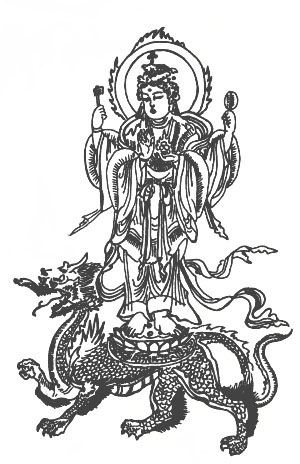|
Now,
before explaining how one can become a Buddha, let me present to you two
fundamental concepts in Buddhism. One is samsara and the other is karma.
Both words are Sanskrit, an ancient language used in India. Samsara is an
aspect of the universe, which cannot be detected by human eyes. It is the
cycle of birth and death of a being. Buddhism teaches that the birth and
death in the present lifetime of a being is only one segment in a chain of
infinite lives of that being. The death of a being is by no means the end.
Buddhism
further teaches that there are five kinds of life forms or existences into
which a being can be reborn. The five kinds of existences are as
heaven-dwellers, to which gods belong, human beings, animals, ghosts, and
hell-dwellers. After death, a human being is reborn into another
existence.
He or she can be reborn as a human being or, perhaps, a heaven-dweller,
animal, ghost, or hell-dweller. Therefore, a human being does have the
opportunity to be reborn as a god in heaven. By extension, a hell-dweller
can also be reborn as an animal, a human being, etc., and a heaven-dweller
can also die and be reborn as a human being, hell-dweller, and so forth.
This change of existences goes, on infinitely unless and until the chain
breaks, which occurs when this concept of birth and death becomes
meaningless to a being. According to Buddhism, this happens when one is
enlightened. Then the concept of birth and death is no longer applicable.
This realization of having no birth and death is called nirvana, another
popular word in Sanskrit. One who achieves the status of nirvana breaks
the chain of samsara and eliminates rebirth in any of the five existences.
Yet, this does not mean extinction. Not only did Buddha Sakyamuni reach
nirvana, many of his disciples did as well.
The next
question is who or what causes samsara? Who or what determines that the
next life of a being will be in heaven or hell, or will take the form of a
human being? A similar question can also be asked: Who or what determines
that the people on earth, although all human beings, vary so much in
appearance, character, wealth, life span, health, fate, etc.? It is even
more interesting to note how much the circumstances in which a person is
born can influence his or her destiny. Which race, which nation, what skin
color, what kind of parents—all these factors make a great difference.
Now, who or what determines these choices? Would it not be more logical to
say that something happened before one's birth that caused all these
effects, than to say that they are purely accidental, or that they are
God's will? If a baby has no past life, then on what grounds does God
judge whether to reward or punish that baby by causing him or her to be
born under such tremendously; different circumstances? According to
Buddhism,
it is not accidental, nor is it God's will. It is one's own actions that
determine one's own destiny. Since Buddhism teaches past, present, and
future lives, the actions of the past, which include all actions taken in
all past lives have a direct effect on one's present and future lives. It
should be pointed out that when I say actions of the past, it includes the
actions of the present because the present is merely an instant, which
does not remain. As soon as we say, "This is the present," it is
already the past.
This
law, that one's own actions determine one's own destiny, is called karma.
In the Random House dictionary, karma is defined as "actions, seen
as bringing upon oneself inevitable results, good or bad, either in this
life or in a reincarnation." I wish to expand this definition by
saying that karma is an action or combination of actions by a being or a
group of beings, which produces effects. Those effects, which can be good,
bad, or neutral, determine the future of that being or group of beings.
Good karma produces good effects, bad karma produces bad effects. Here,
the good or bad effects produced by good or bad karma is purely and simply
a natural phenomenon governed by the natural laws that act automatically
with complete justice, and is not a judgement made by a supramundane
authority such as a god. Furthermore, the good or bad referred to here is
not defined by any code or law created by human beings, unless such code
or law follows the natural laws. For example, when democracy was first
devised, women did not have the right to vote. At that time, women who
complied with that status were considered "good" and those who
fought against it were considered "bad." That judgement was
incorrect, however. The natural law is that human beings are all equal,
and thus, the system which gives women equal voting rights with men is the
truly just one. Therefore, those who opposed the unequal voting system
were actually the good ones.
This
law of karma, or cause and effect, is so powerful that it governs
everything in the universe except, according to Buddhism, the one who is
enlightened. Upon enlightenment, one understands this law thoroughly and
therefore does not fall prey to it by making mistakes in cause and effect.
In this way, the law of cause and effect loses its significance once one
is no longer confused in one's actions and conduct.
-Continued
in next issue |
